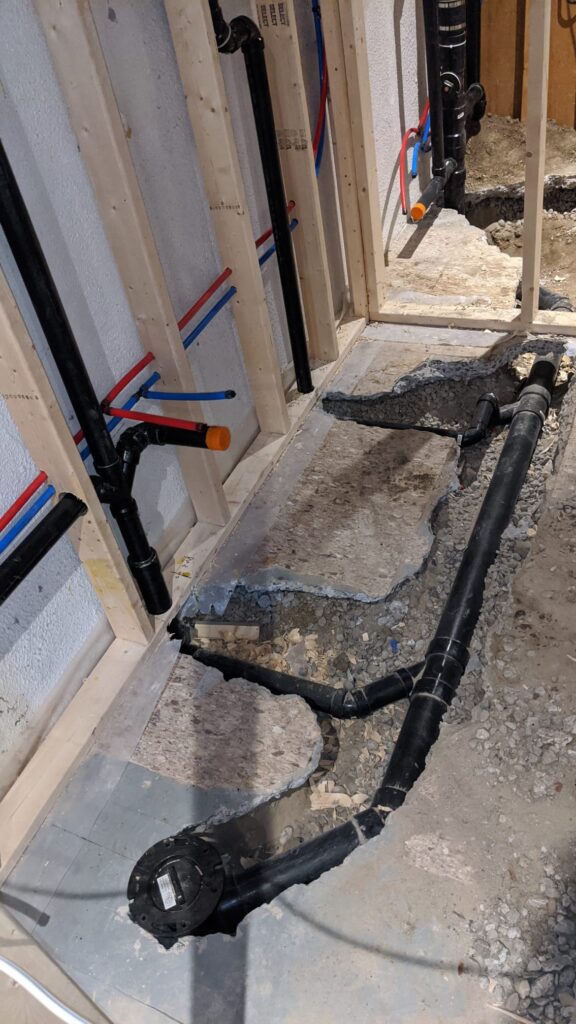Basement leaks are a major concern for homeowners, as they can lead to structural damage, mold growth, and high repair costs. These leaks occur when water infiltrates through walls, floors, or foundations, compromising the safety and comfort of the home. Understanding the causes of basement leaks and learning how to prevent or address them is essential for protecting your property from long-term damage.
Why Do Basement Leaks Occur?
Basement leaks are caused by several factors, primarily related to water pressure, foundation issues, and drainage problems. Poor drainage around your home can cause water to build up around the foundation, leading to leaks. Additionally, cracks in the foundation, worn-out seals around windows, or improperly installed sump pumps can create vulnerabilities for water infiltration. Understanding these causes allows homeowners to take preventative steps before significant damage occurs.
Causes of Basement Leaks and Solutions
Identifying the source of a basement leak is the first step in solving the problem. Below are some common reasons for basement leaks and ways to address them.
Foundation Cracks and Seepage
Cracks in the foundation are one of the most common causes of basement leaks. Over time, the foundation can settle or shift, leading to small or large cracks that allow water to seep into the basement. These cracks can occur due to temperature changes, soil movement, or poor construction.
To fix foundation cracks, start by sealing small cracks with waterproof epoxy or polyurethane injection. For larger cracks or severe structural damage, professional repairs may be necessary, such as applying carbon fiber strips or underpinning to stabilize the foundation.
Improper Drainage Around the Home
Another significant cause of basement leaks is improper drainage outside the home. If water is not directed away from the foundation, it can accumulate around the walls and floors, leading to leaks. Gutters and downspouts that are clogged or poorly maintained can exacerbate this issue.
To prevent this, ensure that your gutters are clear of debris and that downspouts extend several feet away from the foundation. You may also want to install a French drain system or grading improvements to divert water away from your home. Proper landscaping, including sloping the soil away from the foundation, can also help reduce water buildup.
Hydrostatic Pressure and Its Effects
Hydrostatic pressure occurs when groundwater builds up in the soil surrounding your foundation, pressing against the walls and floors. This pressure can cause cracks or force water through small openings, leading to leaks. Homes with basements below the water table or in areas with high rainfall are particularly prone to hydrostatic pressure.
To manage hydrostatic pressure, consider installing a sump pump to help remove excess water from the basement. Interior or exterior waterproofing solutions, such as installing drainage tiles or applying waterproof membranes, can also help alleviate pressure and prevent leaks.
Window Well Leaks and Solutions
Basement windows are another common entry point for water. Poorly sealed or improperly installed window wells can allow water to pool around the base of the windows, leading to leaks. Additionally, debris buildup in the wells can cause drainage issues.
To prevent window well leaks, ensure that the well is clean and has proper drainage. Installing a window well cover can keep debris out and reduce the chances of water pooling. If your window wells do not have adequate drainage, consider adding a drain system to direct water away from the foundation.
Basement Leak Prevention Tips
Preventing basement leaks is easier and more cost-effective than dealing with the consequences of water damage. Here are some practical tips to help you keep your basement dry and free from leaks:
Maintain Your Gutters and Downspouts
Regular maintenance of your gutters and downspouts is essential to ensure proper drainage. Clean out leaves, dirt, and debris to prevent blockages, and check for any leaks or damage to the gutter system. Ensure that downspouts are positioned to direct water away from the foundation, preferably at least six feet from the house.
Inspect and Seal Foundation Cracks
Perform routine inspections of your basement walls and floors to identify any cracks or signs of water seepage. Small cracks can be sealed using specialized waterproofing products, while larger issues may require professional intervention. Addressing foundation cracks early can prevent them from worsening and causing significant water damage.
Install a Sump Pump
A sump pump is a valuable tool for homeowners dealing with basement leaks caused by hydrostatic pressure. It works by collecting and pumping out excess water from the basement, preventing it from rising to the floor level. Consider installing a battery backup for your sump pump to ensure it continues working during power outages.
Ensure Proper Grading Around Your Home
The landscape around your home plays a crucial role in directing water away from the foundation. Make sure the soil slopes away from your home to prevent water from pooling near the foundation walls. If your yard slopes toward your home, regrading may be necessary to improve drainage and prevent leaks.
Basement Leak Detection Methods
Detecting basement leaks early is key to preventing costly repairs. While some leaks are obvious, such as visible water pooling on the floor, others may be more subtle. Here are some ways to detect basement leaks:
Check for Musty Odors
A musty smell in your basement is often a sign of excess moisture or mold growth, which can result from leaks. If you notice this odor, inspect the walls, floors, and any vulnerable areas for signs of water seepage or dampness.
Monitor for Water Stains
Water stains on walls or floors are a clear indication of a leak. Pay attention to discoloration or damp spots, particularly near the foundation, windows, or floor seams. If you find water stains, trace the source of the leak and address it immediately.
Use Moisture Detectors
Moisture detectors or hygrometers are useful tools for identifying areas with excess moisture. Place them in potential trouble spots, such as corners, window wells, or areas with visible cracks. These devices can alert you to rising humidity levels, helping you catch leaks early.
FAQs
What is the best way to waterproof a basement?
Waterproofing a basement involves addressing both interior and exterior issues. Interior solutions include applying waterproof sealants, installing a sump pump, and using drainage systems. Exterior methods may involve improving drainage, installing exterior waterproof membranes, or using French drains.
How can I tell if my basement has a leak?
Common signs of a basement leak include visible water, musty odors, water stains, damp walls, or floor cracks. You may also notice mold growth or peeling paint in areas where water is entering the basement.
Can basement leaks cause mold growth?
Yes, basement leaks can create the perfect environment for mold growth. Mold thrives in damp, humid conditions, and a leaking basement can quickly develop these conditions. Mold can pose health risks, so addressing leaks promptly is essential.
Do I need a professional to repair a basement leak?
While small leaks or minor cracks can often be repaired by homeowners using sealants or waterproofing products, larger issues such as foundation cracks or severe water infiltration should be handled by professionals. A professional assessment can help ensure the leak is properly addressed and prevent future damage.
Conclusion
Basement leaks can be a significant headache for homeowners, but with the right preventative measures and timely repairs, you can keep your basement dry and free from water damage. For hiring Professional visit our site. Regular maintenance of gutters, downspouts, and drainage systems, combined with sealing foundation cracks and installing sump pumps, can go a long way in preventing leaks. Detecting potential issues early on and addressing them immediately will save you from costly repairs and protect the overall integrity of your home.



